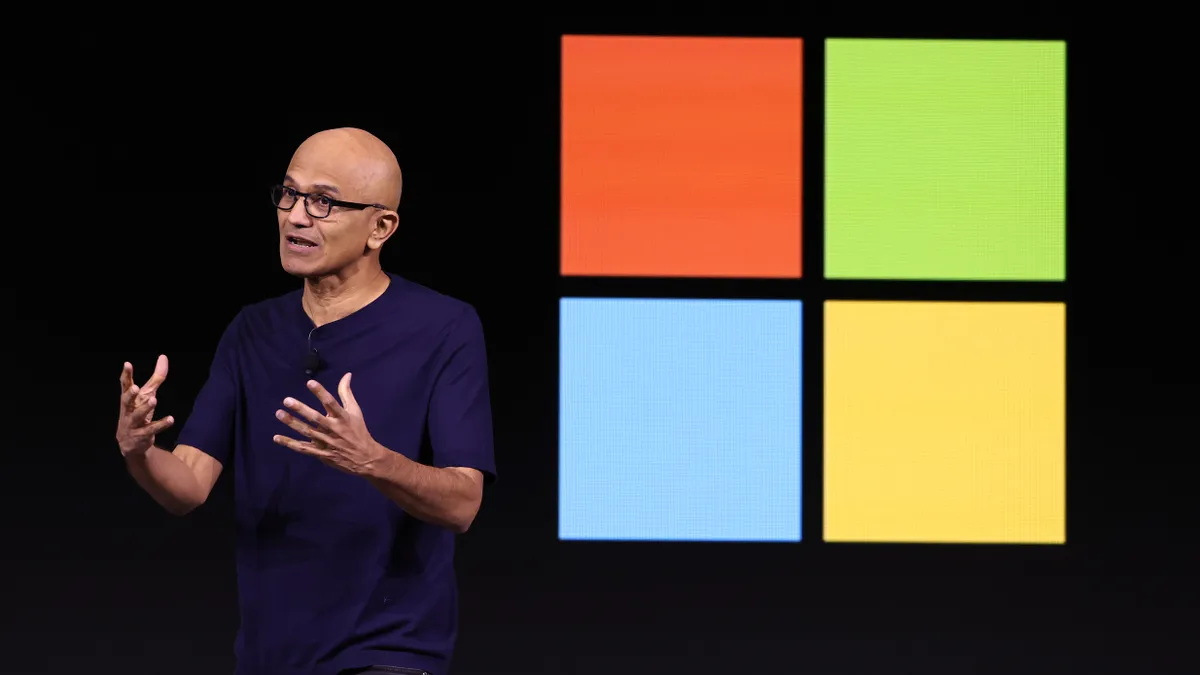Dive Brief:
- Software and technology provider Microsoft’s AI-enabled offerings helped drive $62 billion in sales for its most recent quarter, the company reported Tuesday.
- The $62 billion in revenue reported for the quarter ended Dec. 31 represents an 18% jump year-over-year as the Redmond, Washington-based Microsoft works to establish itself as a leading player in the budding GenAI space. The company’s move to incorporate AI has represented “a real pivot of our investment infrastructure,” CFO Amy Hood said Tuesday during the company’s earnings call in response to analysts questions surrounding managing related costs.
- When focusing on its AI investments, Microsoft wants to be sure they are making them consistently across thier tech stack, Hood said. “The tech stack we're building, no matter what team [it] is on, is inclusive of AI enablement.”
Dive Insight:
Microsoft has swiftly put its partnership with AI provider OpenAI to use following the $10 billion investment commitment it pledged to the ChatGPT creator, integrating the latter firm’s technology into key tools such as its Azure cloud products and its GitHub Copilot tool for developers. Microsoft logged a 30% quarter-over-quarter increase in Copilot subscribers to reach 1.3 million, with the company aiming to make the tool ubiquitous across the platform, executives said during the earnings call, according to a transcript from Seeking Alpha.
Microsoft is leaning particularly hard on AI to drive growth for its cloud offerings; AI-enabled services contributed to stronger than expected cloud growth, with Microsoft reporting $33.7 billion in revenue for the segment — a 24% jump year-over-year, according to the company’s earnings results. Its Azure and cloud services revenue grew by 30%, including six points of growth due to AI, Hood said.
“Our commitment to scaling our cloud and AI investment is guided by customer demand and a substantial market opportunity,” she said. Microsoft remains focused on “execution, so our customers can realize the benefits of AI productivity gains as we invest to lead this AI platform wave,” she said.
The stronger-than-expected growth in cloud still leaves Microsoft battling other heavy-hitters who are also incorporating AI to give themselves a leg up in the cloud race, including Google parent, Alphabet.
Google Cloud revenues reached $9.2 billion in a nearly 27% jump year-over-year, according to Alphabet’s fourth quarter and fiscal 2023 earnings results, also reported Tuesday. That’s compared to the $7.3 billion in the prior year period, a spike attributed to the company’s inclusion of GenAI technologies.
Both the cloud, search and YouTube segments are “already benefiting from our AI investments and innovation,” CEO Sundar Pichai said in a statement. Google search revenue also spiked to $48 billion, a 13% rise year-over-year.
While both Microsoft and Alphabet are moving quickly from merely talking about GenAI to “applying AI at scale,” as Microsoft CEO Satya Nadella asserted, both are also coming up against the nascent technology’s growing pains.
Regulators have zeroed in on GenAI’s use, with the Federal Trade Commission recently opening an inquiry into whether partnerships related to the technology will dampen competition. The FTC issued orders to five companies, including Alphabet, Amazon, Anthropic PBC, Microsoft and OpenAI, asking them to provide further information about the partnerships between GenAI and cloud service providers.
Furthermore, despite the AI-driven growth championed by both Alphabet and Microsoft, recent layoffs throughout the technology sector — including at the two companies — have bolstered concerns surrounding the impact GenAI might have on job security for such workers. Microsoft ended the quarter with a 2% reduction in headcount compared to the prior year period, while Google recorded severance and related charges of $2.1 billion for 2023 as a result of layoffs it announced last January.














